Disrupting the University's Role in the Vietnam War
The anti-Vietnam War movement attacked the war effort at every angle that it could find. Due to the fact that a large portion of the protesters were university students, it was inevitable that the activists would turn towards their own universities to oppose the war. ROTC programs, military research by companies such as Dow Chemical, and military recruitment by all branches of the Armed Forces took place on college campuses across the nation. At the University of Michigan, all three relations between the university and the war effort were very much present.
At the University of Michigan, the ROTC was very active in commissioning students to be officers in the Armed Forces. Furthermore, the University of Michigan conducted military research for the war effort at the Army research lab, Willow Run, and participated in the Institute for Defense Analysis, which was a partnership between the Defense Department and twelve research universities. In at least a few cases, when professors refused to participate in the war research, the University denied them tenureship. Lastly, the University welcomed recruitment by military branches and corporations involved in the war effort, such as DOW Chemical, Du Pont, and General Electrics. The anti-war protestors saw these parts of the war effort being done at the University of Michigan as morally wrong and against what they stood for as university students. Therefore, they protested in almost every way imaginable. Sit-ins, forums, and take-overs of university buildings are just three examples of how students used their protesting capabilities to oppose the continuation and advancement of the Vietnam War on their campus.
The University of Michigan administration was not always accepting of this kind of protesting on its campus. At times, the University allowed the protesting, as long as it stayed non-violent and undisruptive, because it was the students’ right to voice their opinions. However, when building takeovers and forceful interference in recruiting trips took place, the University administration stepped in and took disciplinary action against students and would even involve the police. Overall, the relationship of the University of Michigan with the military and corporations created a web of conflict and strife among students, students and the University, and students with the outside businesses and military on campus.

